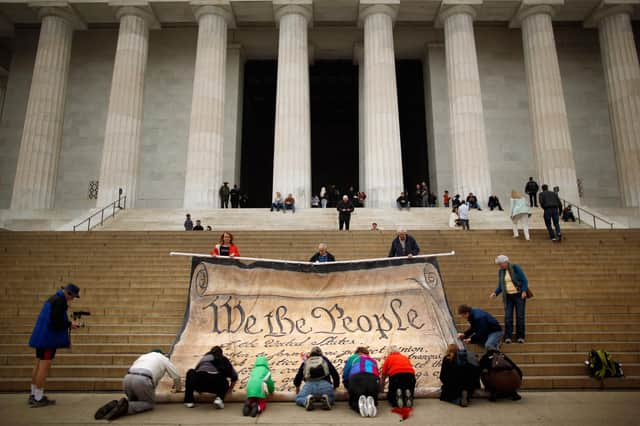Midterm elections: US constitution's undemocratic legacy is fuelling a poisonous political divide – Henry McLeish


Polling organisation FiveThirtyEight puts the Democrats on 45.7 per cent with the Republicans on 44.9 per cent, but the real battles will be fought in a handful of house and senate seats.
Despite Biden’s low approval ratings, polling that hints Hispanic voters are edging towards the Republicans, Donald Trump’s alleged criminality, law-breaking and contempt for democracy being a daily news item, the summer boost to the Democrats of the Supreme Court overturning Roe vs Wade, the cost-of-living crisis, inflation and the Republicans’ merciless attacks on the crime and immigration record of the Democrats, very little is changing on the ground.
Advertisement
Hide AdAdvertisement
Hide AdThe Republicans are expected to win back the House of Representatives with the Democrats retaining control of the Senate, by the slimmest of margins.
The struggle of the Democrats to win control of the Senate, in any year, is made much more difficult because of decisions taken by the Founding Fathers 250 years ago, when, protecting the rights of the 13 states, in this new democracy, was uppermost in their minds.
In the framing of the US constitution and in subsequent amendments, the US Senate, comprising 100 members, presents a significant and enduring problem for the Democratic Party because each of the 50 states – regardless of the number of voters – is entitled to two senators. This gives an extra edge to less populous states which are Republican strongholds.
The wise but inexperienced framers of the constitution had deep concerns about the future of their country and believed safeguards were needed to protect the institution of the presidency. Democracy was a step into the unknown.
The framers were suspicious, and mistrustful of “factions”, the “mob” or the “masses,” and seriously questioned the competence of future voters to make informed decisions.
They were determined to protect the new republic and, in particular, the influence of the states. This historic battle was seen as confronting the “populism, passion and enthusiasm” of the House, with “the advice, wisdom and experience of the Senate”.
This aim, of favouring small states over large states and protecting them from being overwhelmed, ensured US democracy was weakened from the start. Unlike the House of Lords and the Roman Senate, which influenced the framer’s thinking, the US Senate is a powerful institution with the ability to impeach the president, oversee international treaties, affirm or reject crucial presidential appointments, and extensive powers over budget and legislation.
These protections of “states’ rights”, bestowed on the Senate over 200 years ago, look seriously out of place as its power and authority from a limited electoral base now impacts every aspect of American politics and governance, well beyond matters of interest to the states.
Advertisement
Hide AdAdvertisement
Hide AdFrom 1796, the states selected their representatives to the US Senate but from 1913 the 17th amendment, based on the “Connecticut Compromise”, introduced direct elections in each of the states.
The conflict between democracy and protecting states’ rights and the uphill struggle for the Democrats is best illustrated by looking at the 2018 midterm elections. After that vote, the Senate comprised 18 senators from nine large states representing 50 per cent of the US population. In sharp contrast, the other 50 per cent of the population was represented by 82 Senators from 41 states.
Nearly 250 years after the US Declaration of Independence, this looks ridiculous, but it helps to explain the ongoing animosity in the US between federal and state levels.
At the heart of this electoral enigma are questions of federalism versus states’ rights, democracy and the inbuilt bias and the political benefit this bestows on the Republican party.
The House of Representatives represents democracy and voters in each state. The Senate, representing states not people, is unquestionably unfair.
It is hard to escape the conclusion that election to the Senate gives an added and disproportionate importance to small, white, conservative Christian, rural states. Wyoming, with a population of 600,000 people, returns two Senators. California, the most populous state with 40 million people, returns the same number.
This strikes at the heart of US democracy and fuels the deep-seated and at times poisonous divide between Democrats and Republicans on Capitol Hill, dramatically exposing how a constitution drawn up in contrasting times is disadvantaging one of the two major parties in the battle for the Senate.
In the partisan world of American politics, it is now politically impossible to amend or update the constitution of the United States. Achieving a constitutional amendment would require a two-thirds vote in the House and Senate, and ratification from three-quarters of the states.
Advertisement
Hide AdAdvertisement
Hide AdThe Democrats must retain control of the Senate. Polling across America suggests that in the run-up to polling day, the two parties remain in a very tight race.
With the Republican party likely to win back the House of Representatives, the Democrats must retain control of the Senate to ensure that Joe Biden does not become a lame duck president over the next two years, experiencing the same frustrating fate as Bill Clinton and Barack Obama in their second terms.
A Republican majority in the Senate will stall Biden’s legislative programme, derail much-needed domestic reforms and undermine US international commitments to Nato, the EU, the war in Ukraine, energy cooperation and climate change. What happens in the midterms will affect all of us.
Henry McLeish is a former First Minister of Scotland
Comments
Want to join the conversation? Please or to comment on this article.
